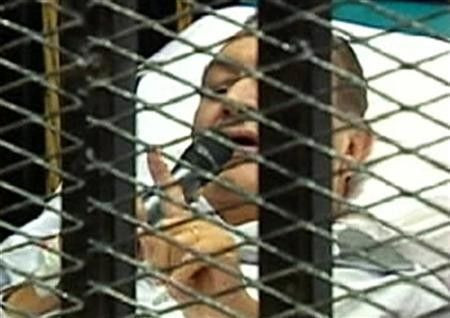Trial of Egypt's Mubarak: A Poignant Metaphor for Dictators' Backlash

The images of former Egyptian president Hosni Mubarak attending court proceedings lying down on a hospital stretcher, placed inside a meshed cage full of defendants, complete the story of mighty backlash.
The court proceedings were televised live across the world, adding insult to his injury. But the majority of Egyptians are reckoning that Mubarak, who ruled the country with an iron fist, has got his comeuppance.
“The trial of Mohamed Hosni Mubarak, the ousted president of Egypt, and his standing behind the bars as a defendant in front of millions around the world via television is an important step forward and a lesson to any dictator, was killed and shedding blood of civilians and gagged mouths, thinking that he is immortal forever and he will not be trailed one day for what crimes he committed against his people,” the Arab Human Rights Network Informations (ANHRI) said in a statement on Thursday.
Mubarak was airlifted from his Sharm-el Sheikh residence to Cairo and is held the International Medical Center located in Cairo-Ismailia. He is facing charges of killing protestors and siphoning off massive wealth from the country's exchequer.
The spectacle of Mubarak lying on the stretcher to hear the charges read out to him was surrealistic, considering that he ruled the country 30 years, centralizing all powers in his hands. The country was in uninterrupted emergency mode all throughout and police harassment of ordinary citizens was routine. Perhaps the only positive outcome of his rule was that political stability prevailed those years.
Mubarak is the first Arab leader to stand trial ever since the wave of popular protests against long-entrenched regimes swept through the region in the beginning of the year.
Former Tunisian president Zine el-Abidine Ben Ali, who fled to Saudi Arabia after his regime fell, setting off an ominous domino chain for hated Arab rulers, was sentenced in absentia to a 35-year jail term in June.
In court on Wednesday, Mubarak denied the charges of ordering the killing of protesters, a charge that could potentially attract a death penalty. "I entirely deny all those accusations," the former president said. Mubarak's trial will resume on August 15, the judge said.
Apart from Mubarak, most members of his inner coterie are embroiled in legal action now. These include his sons Alaa and Gamal, their business partner Hussein Salem, Egypt's former information minister Safwat al-Sherif, former speaker of parliament Fathi Surour and several other National Democratic Party leaders.
Former interior minister Habib el-Adly, along with half a dozen senior police officers, is charged with murder and attempted murder during the government's effort to quell the uprising.
© Copyright IBTimes 2025. All rights reserved.





















